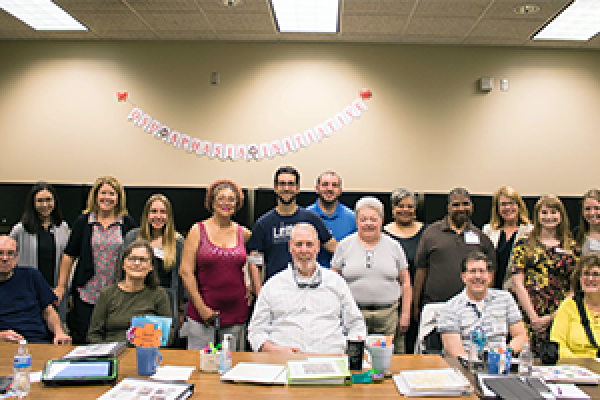Finding a Voice: Aphasia Awareness Month

Speaking is a critical part of everyday life we often take for granted. Imagine if your ability to speak suddenly disappeared.
Aphasia — a language disorder that affects the ability to communicate — usually occurs suddenly, often following a stroke or head injury. It may also develop slowly as the result of a brain tumor or a progressive neurological disease. Approximately one million Americans are living with Aphasia, and nearly 180,000 acquire it each year, according to the National Aphasia Association.
June is National Aphasia Awareness Month.
In central Ohio, persons living with aphasia are finding help through Ohio State’s Aphasia Initiative. Housed in the Department of Speech and Hearing Science on Ohio State’s West Campus, the program is free for persons with aphasia and their caregivers. For four hours a day, three days a week, students in speech and hearing science welcome a group of 10-20 participants for a series of structured group sessions focused on communicating. Some communicate verbally while others do so with the aid of speech-generating devices. Either way, everyone ‘talks.’
“Those who are affected by aphasia have trouble ‘getting the words out.’ They often know what they want to say but have difficulty retrieving the right words,” said Jennifer Brello, clinical assistant professor in the Department of Speech and Hearing Science and director of the initiative. “What we do in our group sessions is provide support to help participants learn functional communication skills through activities that are enriching, engaging and meaningful.”
The structured group sessions take place Monday through Wednesday and all sessions are facilitated by undergraduates and graduate students pursuing degrees in speech and hearing science. Brello, the initiative’s director, is a licensed and certified speech-language pathologist and has designed many of the activities that make up the initiative.
“Through games, music, movies and technology, our participants communicate about the kinds of things we all do — work, politics, travel, family ... life,” says Brello. “Many of our participants have advanced degrees and years of work history. They own their own home or live independently in an apartment. Their life story is not so different from mine or yours. So our group sessions take all of this into account.”
Many of the participants in the group sessions have been involved with the Department of Speech and Hearing Science for years. One participant, a man who taught at a college in central Ohio, had a stroke 16 years ago. He has been attending group sessions for more than three years. “I come to Ohio State to learn and improve,” he said.
Another participant is an Ohio State alumnus with a degree in marketing and logistics who was a member of the Ohio State Marching Band. He owns his home and has a passion for running. He has been participating in the Aphasia Initiative for more than three years. “My speech is really hard, but I'm still working at it” he said. “I’m grateful for the initiative.”
Denise is a mother and caregiver. For her and her son, the program is a lifeline, a lifesaver. “What they do here, every day, is simply amazing,” she said. “It’s a community here, and the support makes all of the difference.”
The Aphasia Initiative is made possible by the generous support of the Foster Family Foundation of Columbus, Ohio.
To learn more about Ohio State’s Aphasia Initiative, visit go.osu.edu/aphasia. To support Ohio State's Aphasia Iniative, give to Foster Aphasia Initiative, Ohio State Fund #315241.
The Ohio State #Aphasia Initiative helps those affected by the language disorder find their voice #ASCDaily
